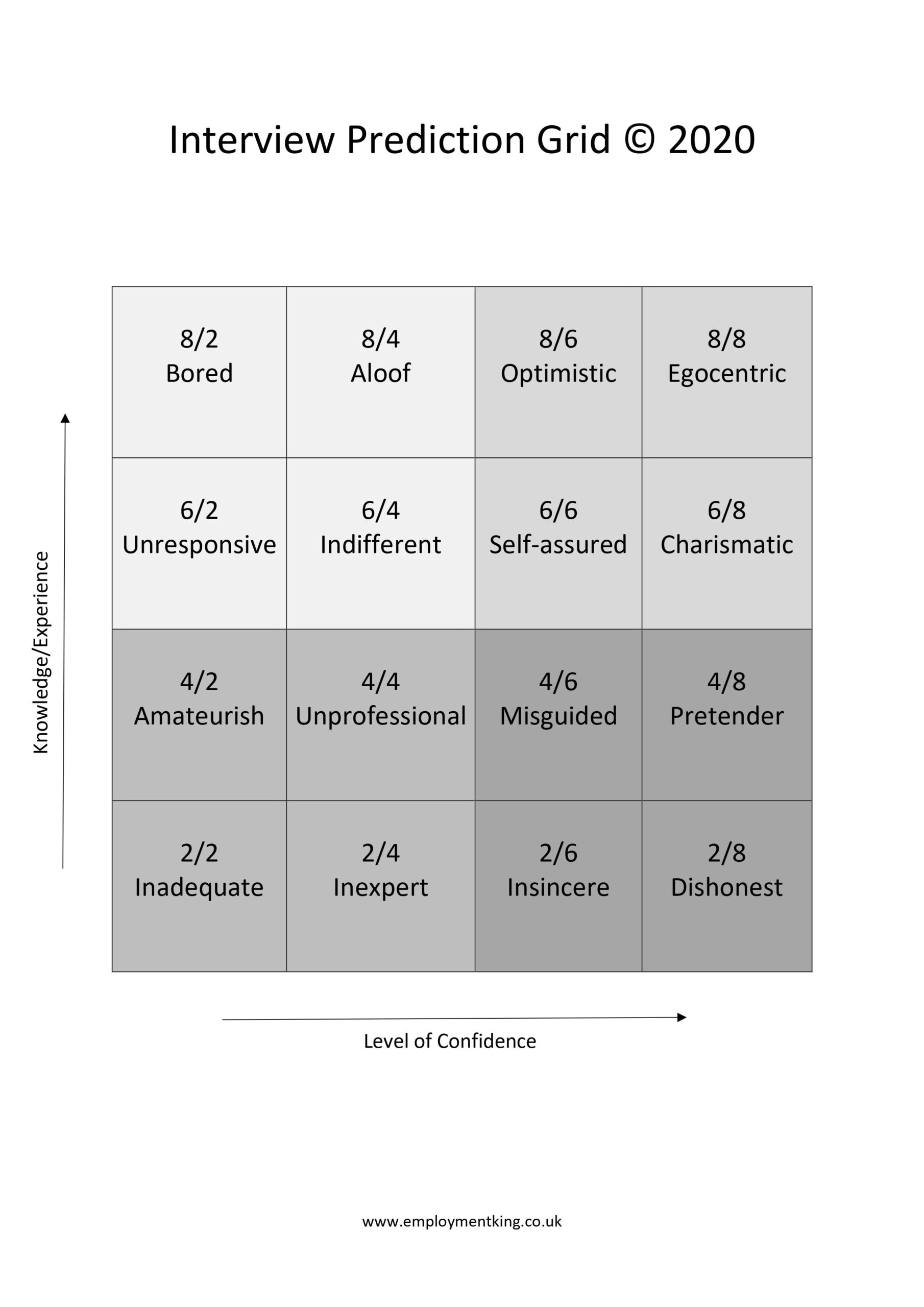Congratulations on completing the Interview Prediction Grid Test (IPG) ©2020.
Below is a breakdown of your Interview Identity
8/6 – Optimistic

8/6 – Optimistic interviewees are qualified career professionals with more than 10 years’ industry experience. They are experts in their field but humble enough not to over-egg their high-level skill set.
Of all 16 interview identities, the 8/6 – Optimistic is more likely to be consistent with receiving job offers. The employability factor comes down to having specialist skills and knowledge gained over a vast period of time. This duration in the industry is directly linked to their ability to identify the job criteria, and thus their ability to prepare high-scoring answers.
It is unlikely that 8/6 – Optimistic interviewees won’t have an example or two that reveals how they meet the scoring criteria. Furthermore, they are able to state sector models and theories with ease and give accurate information (as an example: how the global economy impacts their sector) that can be utilised by the employer.
Impressions are formed based on the applicant’s behaviour, vocal cues and language. As the charming interviewees have a good level of self-esteem, they generally have excellent communication skills. When challenged they are calm, collected, and confident, without being too overbearing. As a self-promoter, they are at ease when discussing competencies creating the impression of intelligence.
In short, interviewers will be impressed with the 8/6 – Optimistic applicant.
Strengths
A career professional with the highest level of industry knowledge is destined for a senior- or expert-level position.
With a wealth of experience, educated to the highest level and often with a natural temperament for the desired role, the optimistic candidate is in demand, often being head-hunted for high paying positions.
The combination of extensive experience, academic ability and character, means they are able to build upon current industry theories, contributing significantly to the field. Previous successes and lessons learnt throughout their duration in the industry allows the applicant to respond decisively to any challenging interview questions.
The pre-interview screening process results in high expectations as the halo effect comes into play. This presumption of excellence is reinforced as the applicants consistently referencing their own talents and expertise.
It isn’t just the candidate’s level of self-esteem along with their exceptional level of knowledge that shapes the persona of being optimistic. More importantly it’s their attitude throughout the job interview: answers are positive. Solutions are found. No detail is too small and no problem too big.
The icing on the cake is the applicants’ ability to reframe any job interview question so their knowledge level is showcased. An example of this is stating less commonly known solutions to familiar interview questions. Imagine a retail employer asking for examples of increasing profits. Common answers relate to price increases or offers. Whereas, the optimist applicant answers strategically, “Decreasing packaging sizes and product content by 1% over a 12-month period has a compound effect on overhead cost.”
Development
Being an expert naturally increases self-worth. Self-worth improves confidence. Confidence increases self-promotion. However, confidence is on a scale meaning that an individual’s self-promotion can vary depending on the person’s mind-set.
Generally speaking, self-promotion is strong, but the optimists aren’t as influential as their high confident counterparts. The small difference in persuasion can create a differential scoring of a high vs medium confidence level applicant.
For senior positions every point counts. Each applicant will possess expertise resulting in high scores being given across the board. The negligible difference of a ‘3’ or ‘4’ score is in fact significant when points are accumulated.
Therefore, the admiration held for a charismatic identity could win the day, even though an optimist is liked. This is especially true for senior position recruitment processes, which often include an informal interview. The non-structured interview relies on an instinctual assessment of the candidate. It is often applicants with the highest confidence levels, therefore the most likely to create affinity, that will be viewed as most suitable.
For senior positions, the interviewer is assessing characteristics as well as competencies. Any thoughts of imposter syndrome and the employer will have concerns over their appointment, especially for high-salaried roles.
Some interviews are purposely hard, employing cold interview tactics. A lack of confidence at this stage will be to the detriment of the interview outcome.
At this level applicants would never disclose weaknesses without reframing their experience. Instead, the aim is to highlight value in terms of what the candidate can bring to the organisation. Doubts, misgivings, or a lack of trust is enough to destroy any chances of a job offer.
Optimists will self-promote, be assertive and influence others, but not at the consistent level of ‘8’ level of confidence applicants. High confident interviewees will use a combination of logic, emotional stories, and intrigue to persuade the interviewer that they, not others, are the best fit for the organisation.

Advice for the job interview
- Use self-praise to its fullest extent. Reframe the weaknesses question, so the focus is on lessons learnt rather than mistakes.
- Don’t leave the interviewer with any potential doubts. Become emotionally intelligent, read non-verbal cues, and adjust answers accordingly
- Remain calm with a cold interviewer. Answer slowly and clearly, as this helps to ‘think on your feet’. Avoid feeling rushed and modify answers when required
Research: IPG





